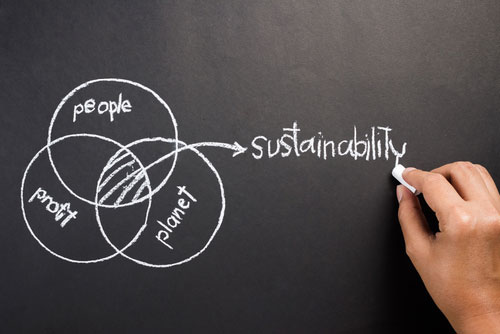What if business schools were (really) up to teaching sustainable development at the heart of their graduation programs?
Business schools train students to become future managers, marketing executives, communication managers, financial directors of small and large companies. Some schools focus harder on training students the skills needed to kick-off companies and become founders and CEOs of start-ups. Others decide to invest stronger in teaching how to make a corporate career and become a specialist in corporate investments, and the financial complexity within the stock market. Either way, business schools are crucial actors in shaping the world as they teach and influence how the business leaders of tomorrow think and create their understanding of business and its role in shaping the world.
However, looking at the world today, and even considering they are not the only ones who have influenced the mindset and skill-set of today’s leaders, and therefore they shouldn’t hold responsibility alone, we can perhaps say business schools could focus more on the sustainability and the triple bottom line of business. Because today, effective and agile decision-making adapted to societal progress and further evolution, has to be one that takes sustainable development (that started being seriously discussed since 1972) into the best of considerations.
Sustainability: The Missing Link In The Curriculum Of Business Schools

The expertise of the School of Business to train their students to changes in management, marketing or communication is recognized. A bit all over the world, these schools are at the forefront of all technical issues related to business. We can find in all business schools a variety of degrees ranging from accounting to private law, finance, business economics, management, human resources or project management. And although it’s increasing, not many business schools offer sustainability-related degrees. Some, mostly masters or MBAs, have a subject focused on it, however, few business schools teach sustainability per se.
The truth is that many management courses haven’t yet truly and deeply integrated the concepts of sustainable development, responsible management or value creation for all in their curriculums. Not many marketing or communication courses succeed at teaching how to put sustainability at the center of organizations’ communication plans – not only for clients or customers, but for suppliers, investors, and other stakeholders. And how internal comms are so important to encourage both employees and the top management to go the extra mile on these issues.
Not many finance courses deeply teach the reality of ESG assessments. Often, sustainability and CSR are a bonus chapter discussed at the end of the year if there’s time for it. Or an optional specific module that’s chosen only by students wishing to continue their course in this domain. Ultimately, this means a large share of future decision-makers in management, finance or economics areas, learn about sustainable development as a side detail, rather than as a priority.
Sustainability: A Need For Business Long Term Survival

Sustainability, in essence, needs to be a transversal issue. No company can be truly responsible or sustainable without its people, be it managers, operational staff or marketing or finance getting some kind of training on sustainability issues first. And training on sustainable development issues like the circular economy, biomimicry, upcycling, the value of green walls, carbon tax or cradle to cradle methodologies – is exactly what companies need to have today and over the next years to make progress on sustainability issues.
Why? Because, among the main concerns of Generation Y and Generation Z, the consumers of today and tomorrow, are the origin and the environmental impact of the products they buy. Moreover, concerns over the impact of products on individuals’ health is also on top of their minds.
Among the emerging concerns of employees are also well-being at work and the desire for an inspiring leadership rather than an autocratic management style. As for the concerns of other stakeholders, they want to know what are the environmental and social stakes of a company and how they can engage and create synergies and partnerships. In the end, all parties are increasingly aware of the need to take CSR and sustainability policies and practices seriously.
Besides all this, figures show sustainability is a real issue today. Companies involved in sustainability perform better than those that are not. Those who invest in well-being at work or in responsible management practices see their employees become more efficient, happier and end up suffering from less turnover (and, therefore, fewer HR costs). Professionals that are aware and master sustainability issues and have specific skills like impact measurement or CSR reporting are already being searched by companies.
The Leaders Of Tomorrow Need To Get Training On Sustainability Today

As we’ve seen, training students in sustainability issues is very important to build a better, sustainable tomorrow – and one with responsible companies. But it is also becoming a regulatory obligation. In fact, the last 10 years have seen a considerable increase in the regulation of sustainability in companies. From European laws to disclose non-financial information to other more localized regulations, companies are increasingly subject to legal requirements to take sustainability into account in their activities.
Reporting, materiality analysis or stakeholder dialogue are all sides of the same sustainability management coin and are becoming legislated. And this is likely to be a speeding trend as new legislation might soon reach other issues such as carbon taxing, the legal responsibility of supply chain managers or the integration of sustainability KPIs (performance goals) into executive compensation. At the same time, other types of standards are also developing as is the case with ISO26000 on responsible management, ISO14001 on environmental management systems or ISO20400 on sustainable purchasing, all of which became prerequisites for working with many organizations.
In short, tomorrow’s leaders will need to be trained in sustainability and resiliency issues because they will not only be fundamental societal issues but also because they will be essential for doing business. But sustainability should not be seen only as a subject or an option. Sustainability should be taught at the heart of every trade. Managers should be trained to guide their teams and mobilize them on this topic. Marketing teams should be trained in responsible communication; and sustainable finance needs to become the new finance – because investors are looking for safe investments with companies able to, for instance, anticipate the events of climate change on food production issues.
Business schools need to be at the forefront of this change by offering not only specialized courses in CSR or sustainability but especially by integrating these skills into the common core structure of each of their courses. And of course, those adapting that adapt faster to this paradigm shift will most likely be the ones at the forefront of teaching sustainability issues in the future.
Image credits to class on Shutterstock, customer on Shutterstock, people on Shutterstock and student on Shutterstock

